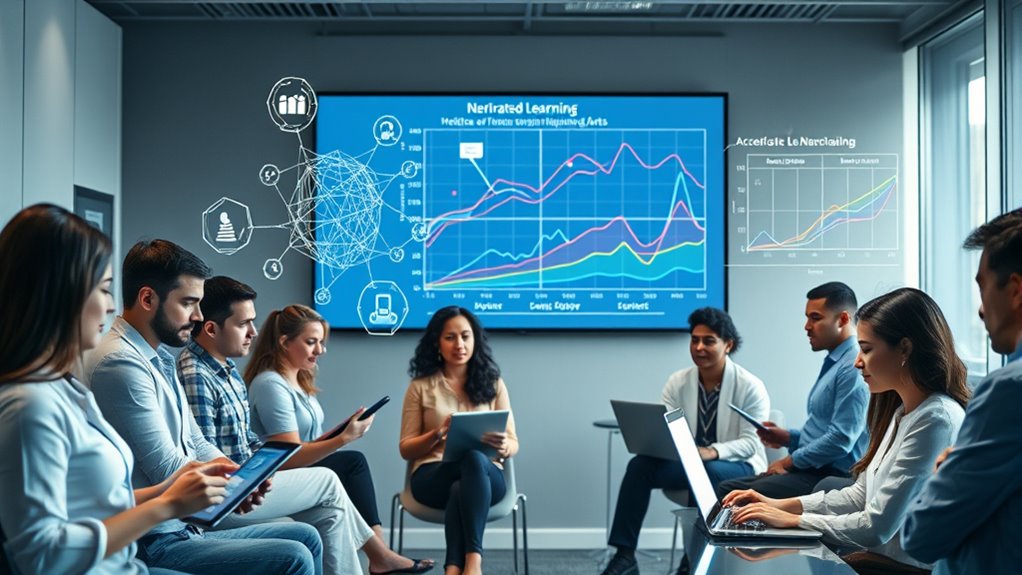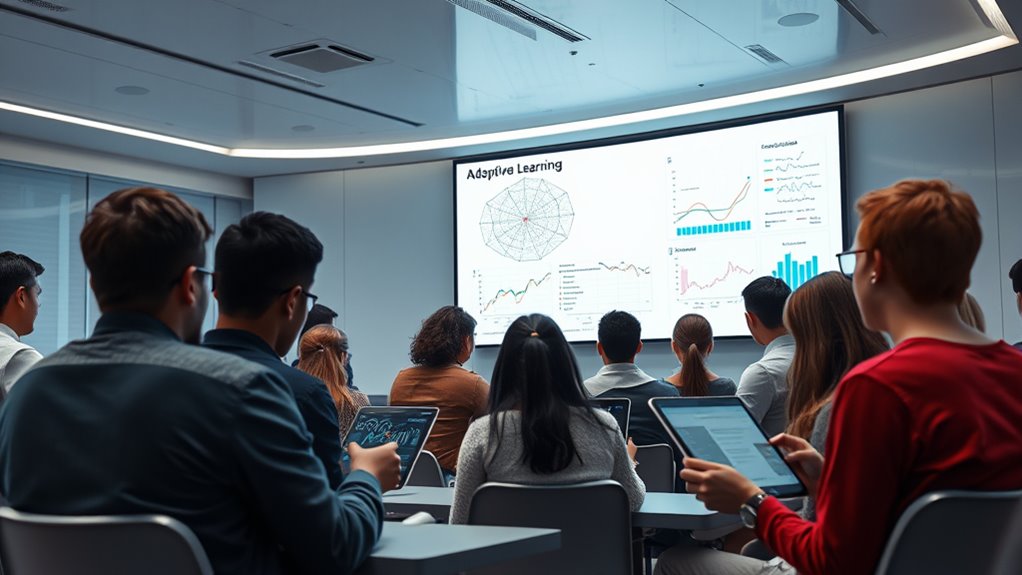Meta-learning helps you accelerate skill acquisition by teaching models and learners to adapt quickly and transfer knowledge across tasks. Techniques like MAML or metric-based methods enable fast learning with minimal data, making it easier to master new skills or adapt to unfamiliar challenges. By focusing on personalized strategies, practice, and reflection, you can improve efficiency and reduce frustration. Keep exploring to discover how these approaches can transform your learning journey even further.
Key Takeaways
- Meta-learning algorithms like MAML enable models to adapt quickly to new skills with minimal data.
- Personalization through meta-learning accelerates mastery by tailoring strategies to individual learning styles.
- Few-shot learning techniques allow rapid acquisition of new skills with limited examples.
- Transfer learning in meta-learning helps apply existing knowledge to unfamiliar tasks efficiently.
- Incorporating cognitive strategies such as reflection and motivation enhances the effectiveness of skill learning.
Understanding the Foundations of Meta-Learning

Meta-learning, often called “learning to learn,” refers to algorithms and models that improve their ability to acquire new skills by leveraging prior experience. At its core, understanding meta-learning involves exploring neural architectures designed to adapt quickly to new tasks. These architectures enable models to transfer knowledge efficiently, avoiding the need to start from scratch each time. Cognitive frameworks underpin this process, mimicking human learning patterns—such as recognizing patterns, adjusting strategies, and applying past lessons to new challenges. By studying these frameworks, you can grasp how meta-learning systems generalize across tasks. The combination of neural architectures and cognitive principles creates a foundation for developing models that learn more effectively, accelerating skill acquisition and broadening their applicability in real-world scenarios. Recognizing the importance of relationships in learning environments can also enhance adaptive strategies and foster better collaboration in skill development.
Key Techniques and Algorithms in Meta-Learning

Building on the understanding of how neural architectures and cognitive principles facilitate quick adaptation, various techniques and algorithms have been developed to implement these concepts in practice. Meta-learning algorithms often focus on optimization techniques that improve learning efficiency across tasks. Model-Agnostic Meta-Learning (MAML), for example, trains neural architectures to quickly adapt with minimal gradient steps. Other approaches, like metric-based methods, use similarity measures to generalize knowledge to new tasks. Optimization techniques such as gradient-based updates or meta-optimizers help tune models for rapid skill acquisition. These algorithms enable neural architectures to learn how to learn, streamlining adaptation. By leveraging these key techniques, meta-learning systems can markedly accelerate skill development across diverse domains.
How Meta-Learning Enhances Rapid Skill Acquisition

Meta-learning speeds up your learning process by helping you grasp new skills more quickly. It also adapts to unfamiliar tasks with minimal training, saving you time and effort. Plus, it improves skill transfer, so you can apply what you’ve learned in one area to other related challenges. Incorporating effective tools and techniques from paint sprayer reviews can further enhance your ability to master new skills efficiently.
Accelerating Learning Processes
Because it enables systems to adapt quickly to new tasks, meta-learning considerably accelerates your learning process. It helps identify your unique learning styles, allowing you to focus on strategies that work best for you. By tailoring approaches to your preferences, meta-learning boosts motivation techniques, making practice more engaging and effective. This personalized method shortens the time needed to grasp new skills and reduces frustration. Instead of following generic methods, you leverage meta-learning to optimize how you learn, emphasizing efficient, targeted practice. As a result, your brain becomes more adaptable, enabling faster mastery. Understanding toilet flushing mechanisms can also serve as an analogy for how adaptive learning strategies function in optimizing performance. Overall, meta-learning transforms the way you approach skill acquisition, turning rapid progress into a consistent reality through smarter, personalized learning strategies.
Adapting to New Tasks
When faced with new tasks, your ability to adapt quickly determines how efficiently you can master them. Meta-learning helps overcome transferability challenges and adaptability barriers by teaching models to generalize skills across different contexts. This accelerates your learning curve, enabling faster adjustment to unfamiliar challenges. Techniques like few-shot learning allow you to grasp new tasks with limited data, reducing the time spent on trial and error. You become more flexible, leveraging prior knowledge to navigate novel situations seamlessly. These strategies minimize the frustration caused by transferability challenges, making learning more efficient. By focusing on adaptability, meta-learning empowers you to approach new tasks with confidence, transforming the way you acquire skills in unfamiliar environments. Incorporating essential oils for rapid recovery, such as lavender or peppermint, can also help improve focus and reduce stress during the learning process, further enhancing your ability to adapt.
Enhancing Skill Transfer
Enhancing skill transfer is at the core of how meta-learning accelerates your ability to acquire new abilities quickly. By focusing on transfer efficiency, meta-learning helps you apply learned skills across different contexts, improving your adaptability. Instead of starting from scratch each time, you leverage prior knowledge to speed up learning new tasks. This process promotes skill generalization, enabling you to recognize underlying patterns and principles that apply broadly. As a result, you become more versatile, transferring insights from one domain to another with ease. Meta-learning models facilitate this by training on diverse tasks, which strengthens your ability to generalize skills efficiently. Ultimately, this approach shortens the learning curve and boosts your confidence in tackling unfamiliar challenges.
Practical Applications Across Different Domains

You can apply meta-learning techniques to transfer skills across different fields, making learning more versatile. Rapid learning strategies help you acquire new abilities faster, regardless of the domain. Exploring these applications shows how meta-learning accelerates growth in diverse real-world settings. For example, understanding best anime movies can inspire creative storytelling methods applicable in various media formats.
Cross-Domain Skill Transfer
Cross-domain skill transfer allows individuals and systems to apply knowledge gained in one area to accelerate learning in entirely different fields. This process relies on techniques like domain adaptation and transfer learning, which help bridge gaps between varied domains. By leveraging what you’ve already learned, you can fast-track acquiring new skills, even in unfamiliar areas. Studies show that homes without security systems are 300% more likely to be burglarized, highlighting the importance of applying protective measures across different contexts.
- Improve performance in new tasks by recognizing underlying similarities
- Use transfer learning to adapt models across different industries
- Reduce training time with pre-existing domain knowledge
- Enhance AI systems with cross-domain capabilities
- Overcome domain-specific challenges through flexible adaptation strategies
Rapid Learning Strategies
Rapid learning strategies enable individuals and systems to acquire new skills efficiently by leveraging proven techniques like deliberate practice, spaced repetition, and scaffolded instruction. These methods tap into neural adaptation, optimizing how your brain forms new connections. Learning heuristics guide your approach, making practice more effective. For example, in language learning, spaced repetition helps cement vocabulary, while scaffolded instruction simplifies complex concepts. Here’s a visual overview:
| Technique | Domain Example | Key Benefit |
|---|---|---|
| Deliberate Practice | Musical instruments | Refines precision and speed |
| Spaced Repetition | Language acquisition | Enhances retention |
| Scaffolded Learning | Technical skills (coding) | Builds confidence gradually |
Additionally, understanding cookie categories and managing user consent can improve the user experience when applying online learning platforms or digital tools supporting skill acquisition.
Challenges and Limitations in Meta-Learning Approaches

Despite its promise to accelerate skill acquisition, meta-learning faces several significant challenges that hinder its widespread effectiveness. Overfitting pitfalls are common, where models become too tailored to training tasks and struggle to generalize. Additionally, the computational demands are high, requiring substantial processing power and time, which can limit accessibility. You might also encounter data scarcity issues, as meta-learning needs diverse datasets to perform well. Furthermore, developing robust algorithms that adapt quickly remains complex, often leading to inconsistent results. Finally, ensuring stability during training is difficult, with models sometimes diverging or failing to converge. These limitations highlight the need for careful design and resource investment when applying meta-learning to real-world skill acquisition. Incorporating content quality and topical authority principles can help mitigate some of these issues by enhancing model robustness and relevance.
Future Trends and Opportunities in Meta-Learning

As meta-learning continues to evolve, several promising trends are shaping its future potential. Quantum computing stands out as a game-changer, offering the possibility to process complex meta-learning algorithms at unprecedented speeds. This could markedly enhance personalized skill acquisition and adaptability. Simultaneously, ethical considerations are gaining importance, prompting you to think about privacy, fairness, and transparency in deploying meta-learning systems. Future opportunities include integrating multi-modal data sources and developing more robust, generalizable models that adapt across diverse tasks. Advances in hardware and algorithm design will make meta-learning more accessible and efficient. By addressing ethical challenges head-on and leveraging emerging technologies like quantum computing, you can help unseal new avenues for accelerating skill development across various domains. Additionally, understanding ethical AI principles will be crucial to ensure responsible deployment of these advanced systems.
Strategies for Implementing Meta-Learning in Personal Development

To effectively implement meta-learning in your personal development, start by clearly defining your goals and the specific skills you want to acquire. This focus allows you to tailor your strategies and stay motivated. Incorporate mindful reflection regularly to evaluate what methods work best and adjust accordingly. Use motivation boosting techniques, like setting small milestones, to maintain momentum. Experiment with different learning approaches to discover what accelerates your progress. Keep track of your progress to identify patterns and insights. Additionally, exploring diverse cultural and regional breakfasts can inspire new ways to approach learning routines and incorporate variety into your skill acquisition process. Ultimately, stay flexible and open to adjusting your plans as you learn more about your strengths and weaknesses. These strategies help you harness meta-learning effectively, ensuring continuous growth and skill mastery.
Frequently Asked Questions
How Does Meta-Learning Compare to Traditional Learning Methods?
You might wonder how meta-learning compares to traditional methods. Meta-learning focuses on developing adaptive strategies and enhances your cognitive flexibility, allowing you to learn new skills faster by recognizing patterns across tasks. Unlike traditional approaches that often follow fixed routines, meta-learning teaches you to adapt and apply previous knowledge efficiently. This dynamic process accelerates skill acquisition, making you more versatile and capable of tackling diverse challenges with confidence.
Can Meta-Learning Be Personalized for Individual Learning Styles?
You can personalize meta-learning by tailoring adaptive feedback and learning preferences to your individual style. By adjusting the pace, content, and difficulty based on your progress, meta-learning adapts to your needs. This creates a dynamic, responsive experience that aligns with your unique learning preferences, making the process more effective and engaging. As a result, you become more motivated and retain skills better, accelerating your overall learning journey.
What Are the Ethical Considerations in Applying Meta-Learning?
When applying meta-learning, you need to consider ethical issues like data privacy, ensuring personal data is protected. You also have to address algorithmic bias, which can lead to unfair or discriminatory outcomes. You should be transparent about how algorithms make decisions and seek consent from users. By actively managing these concerns, you help foster trust and fairness in deploying meta-learning systems.
How Accessible Are Meta-Learning Tools for Beginners?
Meta-learning tools are becoming more accessible for beginners, but learning barriers remain. You might find some platforms complex or overwhelming initially. To overcome this, focus on beginner strategies like starting with simple tutorials, seeking community support, and practicing consistently. As you gain confidence, these tools will become easier to navigate, helping you accelerate skill acquisition effectively. Keep patient, and you’ll see progress faster than you expected.
What Industries Will Benefit Most From Meta-Learning Advancements?
Imagine a master key opening doors to new possibilities—meta-learning does just that for industries. You’ll find healthcare automation transforming patient care faster and more accurately, while financial modeling becomes sharper, helping you make smarter decisions. As these advancements grow, you’ll notice how meta-learning speeds up skill development, empowering you to adapt quickly and thrive in a rapidly changing world. It’s a game-changer across sectors, revealing potential you never thought possible.
Conclusion
By mastering meta-learning methods, you can markedly multiply your mastery and momentum. Embrace evolving techniques, explore endless applications, and endure challenges with confidence. Remember, consistent curiosity cultivates competence, and continuous curiosity creates colossal competence. As you explore more deeply, you’ll discover that dedication, determination, and a daring desire to learn propel you toward proficiency. Keep pushing boundaries, and watch how meta-learning transforms your skills, sparking success and self-sufficiency at every step.









